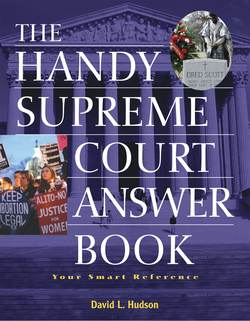Читать книгу The Handy Supreme Court Answer Book - David L Hudson - Страница 224
На сайте Литреса книга снята с продажи.
In what two decisions involving the confiscation of Loyalist property did the Supreme Court establish its authority over state courts?
ОглавлениеOne of the controversial issues arising with the early Marshall Court concerned the confiscation of property from those loyal to the British government—individuals often called Loyalists. At issue in Fairfax’s Devise v. Hunter’s Lessee was the legality of the state of Virginia’s confiscation of the estate of the late Lord Thomas Fairfax, including a stretch of land called the Northern Neck of Virginia.
Lord Fairfax had instructed that, upon his death, the property would be bequeathed to his nephew, the Reverend Denny Martin. However, state officials confiscated the land and sold the land to investor David Hunter. The Virginia courts determined that the property belonged to Hunter, reasoning that its state laws dealing with the confiscation of property were constitutional. The U.S. Supreme Court reversed the Virginia court’s decision, with Justice Joseph Story reasoning that the land should go to Fairfax’s heirs. Story also noted that under the unpopular Jay Treaty with the British, the confiscation of Loyalist land was illegal.
On remand, the Virginia Supreme Court thumbed its nose at the U.S. Supreme Court, questioning the authority of the Court under Section 25 of the Judiciary Act of 1789, which gave the Court the jurisdiction to hear appeals from state courts. The Virginia Supreme Court jurists, such as the well-known Spencer Roane, criticized the Court’s opinion. Roane believed that the federal government was encroaching upon the sovereign authority of the state of Virginia.
The Virginia Supreme Court essentially ignored the U.S. Supreme’s Court commands, turning a title dispute over land into a major constitutional battle between a state supreme court and the U.S. Supreme Court. The case returned to the U.S. Supreme Court under the name Martin v. Hunter’s Lessee, as the living heir of Lord Fairfax was Denny Martin’s younger brother, Thomas Bryan Martin, who was also a nephew of Lord Fairfax. In this decision, Justice Story rebuked the Virginia Supreme Court and affirmed the constitutionality of Section 25 of the Judiciary Act of 1789.
CourtSpeak: Martin v. Hunter’s Lessee Property Confiscation Case (1816)
Justice Joseph Story (majority): “The constitution unavoidably deals in general language. It did not suit the purposes of the people, in framing this great charter of our liberties, to provide for minute specifications of its powers, or to declare the means by which those powers should be carried into execution. It was foreseen that this would be a perilous and difficult, if not an impracticable, task. The instrument was not intended to provide merely for the exigencies of a few years, but was to endure through a long lapse of ages, the events of which were locked up in the inscrutable purposes of Providence. It could not be foreseen what new changes and modifications of power might be indispensable to effectuate the general objects of the charter; and restrictions and specifications, which, at the present, might seem salutary, might, in the end, prove the overthrow of the system itself. Hence its powers are expressed in general terms, leaving to the legislature, from time to time, to adopt its own means to effectuate legitimate objects, and to mould and model the exercise of its powers, as its own wisdom, and the public interests, should require.”
